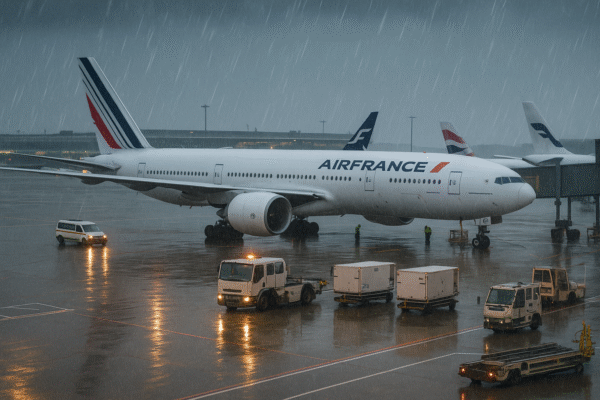As the Middle East navigates a fragile ceasefire between Iran and Israel, international travel across key global routes continues to face massive disruptions. Despite diplomatic breakthroughs, the ripple effects on aviation remain intense, particularly for travelers in Australia, Greece, Iran, and the United States. Limited airspace access, rerouted flights, security concerns, and transit bottlenecks have converged to create a chaotic and uncertain landscape for long-haul flyers.
While the de-escalation in hostilities brought hope of recovery, major international hubs in the Gulf—Doha, Dubai, and Abu Dhabi—are still grappling with backlog and congestion. Airlines such as Emirates, Etihad Airways, and Qatar Airways are gradually restoring operations but warn that full recovery may take days. The impact is being felt across continents, with passengers in Sydney, Athens, and New York reporting multi-day delays, missed connections, and split itineraries.
A recent incident involving a Sydney-to-Athens traveler illustrates the growing complexity of international flight planning. Originally scheduled to transit via Abu Dhabi, the passenger’s itinerary was split unexpectedly following a reschedule by the airline. The outbound and connecting segments were no longer linked in the booking system, leaving the traveler stranded without confirmation for the second leg and unable to rebook under the same fare class.
This reflects a broader pattern of operational strain. On June 23, Iranian missile activity near U.S. military installations in Qatar prompted airspace restrictions across the Gulf, affecting hundreds of flights. Although the immediate threat has subsided and most air corridors have reopened, many carriers are still playing catch-up—dealing with displaced aircraft, rescheduling crews, and sorting out overlapping passenger itineraries.
Travelers flying from Australia and the U.S. to Greece and other parts of Europe are especially impacted. Gulf carriers, often chosen for their competitive fares and wide-reaching networks, typically operate with tightly timed layovers. When even one leg is delayed or rerouted, the rest of the journey becomes uncertain—particularly for those on non-refundable or separately booked tickets.
Qatar Airways, which faced substantial delays following the airspace closures, has publicly stated that its operations are “progressively stabilizing,” but full normalization may not occur until June 26 or later. Emirates and Etihad are facing similar timelines. Meanwhile, U.S. and Australian carriers are rerouting around sensitive airspace, leading to extended flight durations and increased fuel costs.
For passengers, the experience has been especially frustrating. Many airlines have introduced temporary waivers to allow itinerary changes without penalties. However, these policies often exclude basic economy or non-flexible fare classes. Travelers must navigate long wait times with customer service, unclear refund policies, and a lack of transparency on rebooking rights.
Insurance coverage adds another layer of confusion. Standard travel policies frequently exclude claims related to war, political unrest, or terrorism—meaning passengers stranded due to Middle East instability may find themselves ineligible for reimbursement. Insurance providers are advising travelers to review their policies thoroughly and consider purchasing add-on protections for high-risk zones.
Security experts caution that the geopolitical situation remains fluid. While the ceasefire holds, diplomatic relations remain tense, and sudden escalations could reignite airspace closures or regional military alerts. With summer travel demand surging, the current instability poses a critical challenge to global aviation.
Authorities and travel experts are urging travelers to take proactive measures. These include:
- Booking flights with flexible or refundable options.
- Ensuring that all legs of an international journey are under a single booking reference.
- Avoiding layovers in conflict-prone regions if alternatives exist.
- Using airline mobile apps to track real-time updates and rebooking opportunities.
- Registering travel plans with local embassies or government traveler alert services.
In addition, travelers are advised to carry backup funds, emergency contact numbers, and alternative routing options in case of last-minute itinerary changes. Hotel accommodations near transit hubs should also be considered for extended layovers or overnight delays.
For airlines, this crisis highlights the need for better contingency planning. Many travelers affected by the recent chaos reported that automated systems failed to reassign or confirm bookings, and support teams struggled with case volume. Improved coordination between alliance partners and clearer communication protocols could help reduce confusion during future disruptions.
In conclusion, while the Israel-Iran ceasefire has curbed immediate regional hostilities, the aviation sector is far from stabilized. Australia, Greece, Iran, and the U.S. continue to grapple with disrupted connections, stressed airline systems, and uncertain skies over the Middle East. Until airspace fully reopens and airline operations return to normal, travelers must stay alert, informed, and flexible.
The coming weeks will determine whether this ceasefire marks a lasting calm or merely a pause in ongoing tensions. For now, global aviation remains on edge, and passengers are navigating one of the most complex travel environments in recent memory.
For more travel news like this, keep reading Global Travel Wire
















